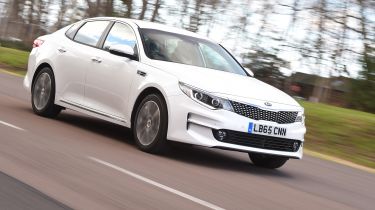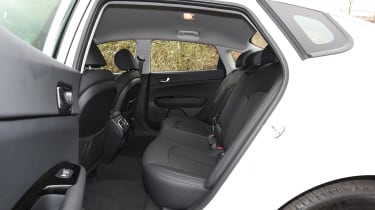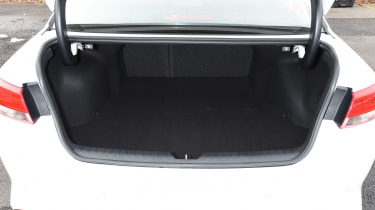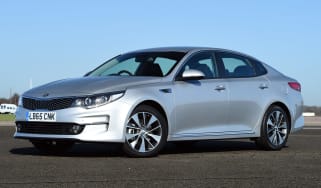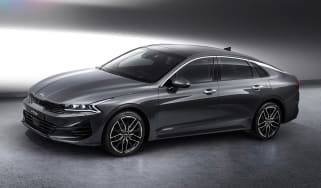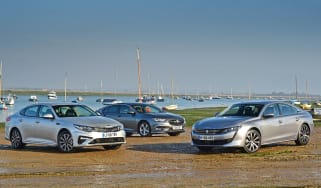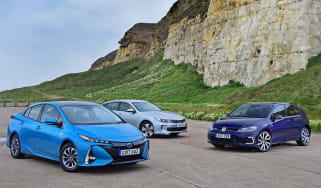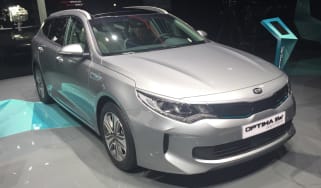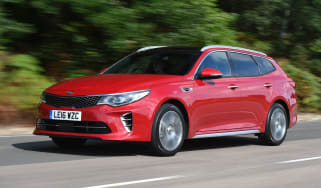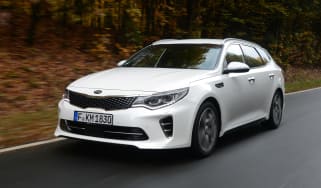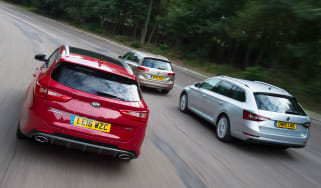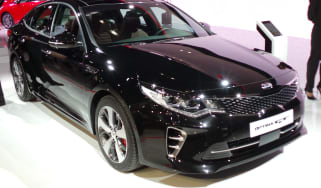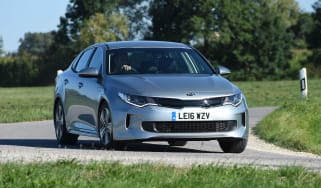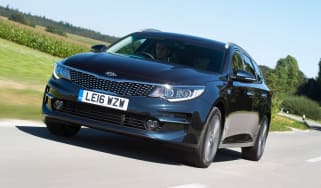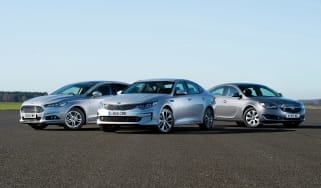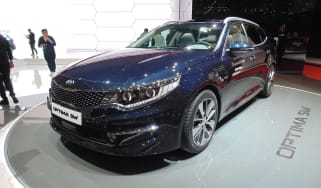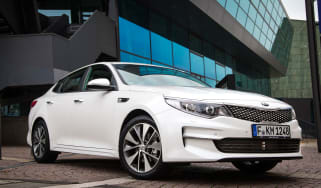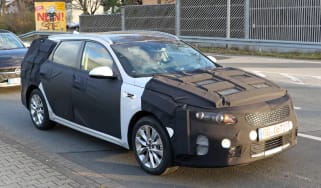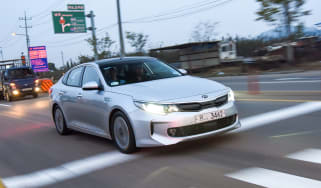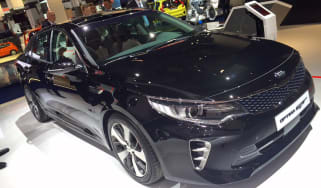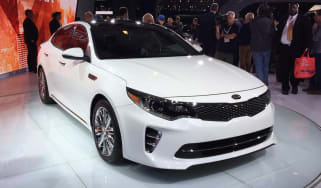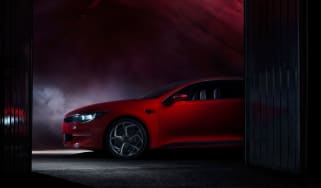Kia Optima review
The Kia Optima is a good-looking saloon that's comfortable, well equipped and offers great value for money

The Kia Optima is a stylish saloon aimed at the Ford Mondeo and Volkswagen Passat. It sits proud in a segment destined for decline, offering space, kit and quality, wrapped up in a reliable Kia-branded package. If you're after an economical and good value family car, the Optima should be on your list.
If you’re not too worried about the badge on its nose, there’s a lot to admire about the latest Kia Optima. Its striking looks are complimented by sharp LED daytime running lights and a rakish profile, while inside the dash is competently presented too, with decent looks and a high quality feel. But it’s the specification that impress the most; the Optima is groaning with luxury toys and gadgets, even if you can only stretch to the entry-level 2 trim.
There's only one diesel engine and one hybrid to choose from, but the latter offers a usable electric range as well as silent EV commuting. It's an impressive set-up, and beats the diesel hands down if you have regular access to a charge point. A more practical Optima SW estate model is also available, with both diesel and plug-in hybrid powertrains available here too.
With a spacious cabin and decent luggage space, the Optima saloon is a great choice for families who will appreciate the model’s safety credentials. Factor in the low running costs, and the only real fly in the ointment is a driving experience that’s less than inspiring – but that won't matter a jot to the practically minded motorist.
Used - available now

2023 Citroen
C3 Aircross
41,513 milesManualPetrol1.2L
Cash £11,097
2020 Kia
Stonic
48,000 milesManualPetrol1.0L
Cash £9,897
2021 Vauxhall
Corsa
32,947 milesManualPetrol1.2L
Cash £9,697
2022 Smart
EQ ForFour
10,678 milesAutomaticElectric
Cash £8,497Family cars are falling out of favour with the public, but cars like the Kia Optima still have their merits. They are practical, spacious and will return better fuel economy than a similarly sized SUV. Even better is the fact they look stylish and subtle, without the brash in-your-face looks of a high-riding 4x4. For some people, that matters.
The Optima has been part of Kia's model range for nearly 20 years, although the first two generations went on sale in the UK under the Magentis name plate. The Optima Mk3 was launched in the UK in 2010, but it was replaced by the Mk4 in 2016. This fourth generation car was a subtle evolution of the last car, but featured a more distinctive grille, more kit, and was also offered in SW Sportswagon estate guise for the first time.
Power comes from a choice of two engines, either a 139bhp 1.7 CRDi four-cylinder diesel or a 202bhp 2.0-litre petrol plug-in hybrid. The diesel engine comes with a six-speed manual gearbox as standard, while a seven speed auto is also on offer. The diesel Optima comes in a relatively narrow range of trims - 2, 3 and GT Line S - with the auto box offered as an option on 3 trim, and as standard on the GT Line S. However, while the trim levels are limited, all models are generously equipped. Prices start from around £22,000.
The Optima PHEV is considered a standalone model, so there's only one version on offer. Like the rest of the range, your only choice is whether you want a saloon or SW estate. The PHEV gets a 2.0-litre petrol engine and a 68kW lithium-ion battery pack that's connected to an electric motor. The electric system is good for a range of around 35 miles, although the amount of charge and fuel you use will be entirely dependent on how often you can charge the battery. The plug-in model is the most expensive version of the Optima, and carries a £4,000 premium over the next most expensive Optima, at around £34,000, although it does qualify for the Government's Plug-in Car Grant.
Rivals for the Optima include the standard family car line-up, including the Skoda Superb, Vauxhall Insignia, Ford Mondeo, Volkswagen Passat, Mazda 6, Toyota Avensis and Peugeot 508, while the Hyundai i40 is closely related to the Optima.
If you're looking at the Optima PHEV, then plug-in rivals include the Toyota Prius Plug-in and the expensive VW Passat GTE, while there's a closed-hybrid version of the Mondeo available, and the Lexus IS 300h is also worth considering.
Engines, performance and drive
In corners, the Optima is surprisingly agile, considering its relatively heavy kerbweight. It’s no sports car, but the chassis has plenty of grip and doesn’t tie itself in knots with quick direction changes. And while the steering lacks feedback and is a little vague, the Optima is marginally more engaging to drive than a VW Jetta. The car leans and rolls more in corners than we’d like though, and the Optima is most at home in the role of a comfortable cruiser.
Whether in town or on the motorway, the soft suspension soaks up bumps well, even on 18-inch wheels. The cabin is generally a quiet place to spend time, although when you get up to speed, the Optima's large wheels and tyres on higher-spec models generate noticeable road noise in the cabin. Wind noise is kept under control though, and even the engine – noisy under acceleration – settles down when cruising.
In the Optima PHEV, the extra weight of the batteries make their presence felt. On the road, the PHEV feels ponderous when compared to other plug-in rivals, and it gives the impression it has to work hard to overcome its weight. In electric mode it's not as smooth as a Prius Plug-in, as the gearbox jerkily engages the next ratio. Still, what the PHEV lacks in refinement when using its batteries, it makes up for with decent efficiency – we travelled around 35 miles in zero-emissions EV mode when we tested the Optima PHEV, despite the car’s trip computer claiming a 31-mile range after a full charge.
However, it’s the ride and handling that let the Kia down most. Despite stiffer suspension, the car turns in lazily, while the steering is light and gives little feedback. Through fast turns the hefty batteries cause it to lurch uncomfortably as the extra weight over the back axle tries to force the rear wheels wide. The ESP cuts in smoothly, but it still feels disconcerting. Bumps and potholes aren’t filtered out as well as in rivals, while broken tarmac causes the Optima to shudder – a pity, because on smooth roads it’s quiet.
Engines
Fire up the Kia’s 1.7 CRDi diesel, and it sounds pretty rattly from both inside and outside the car. The Kia is let down by a rather flat power delivery, as it only really gets into its stride above 3,500rpm. The engine offers a slight improvement on the third generation car in performance terms though, as power is up to 139bhp and torque boosted to 340Nm. Kia claims a 0-62mph time of 10 seconds, but you have to work the engine hard to make progress as the Optima feel heavy.
Putting your foot down is not a particularly rewarding experience due to the noise and lack of refinement under acceleration. The manual gearbox feels a bit limp and disconnected too, so there’s not much about the Optima at all to encourage spirited driving. There is a seven-speed dual clutch auto option, which actually responds quite well to driver input – kicking down quickly and allowing you to better manipulate the car's slug of toruqe. It's not as engaging, though, and better suited to motorway driving.
The a PHEV plug-in hybrid offers a 33-mile all-electric range and can do 0-62mph in 9.4 seconds. The instant torque from the electric motor means it feels pretty peppy of the line, but it starts to fall behind at higher speeds. Unusually, the PHEV uses a six-speed twin-clutch gearbox rather than a CVT, and it suits the car nicely. It feels smooth and efficient, mating well with the car's relaxed nature.
When the 2.0-litre petrol engine fires into life, it’s noisy, but when we tested the PHEV it was a second faster than Kia’s 0-62mph claim. However, the Optima’s mass made itself evident during our in-gear tests, where it felty slow.
MPG, CO2 and Running Costs
There are two engine options on the Kia Optima. A 1.7-litre CRDi diesel, and a PHEV plug-in hybrid. The diesel will suit most buyers, but if you're after rock-bottom running costs and have regular access to a charge point, the PHEV could work for you.
The diesel-powered Kia Optima is a frugal machine, though, averaging 67.3mpg on the combined cycle, with CO2 emissions as low as 110g/km. Kia says that’s an efficiency improvement of 14 per cent over the pre-facelift car, and aside from the environmental benefits, these figures also mean a low tax bill for both private and company car drivers.
However, compared with more recent rivals such as the Mazda 3 Fastback and Audi A3 Saloon, the Optima trails behind. Likewise the Ford Mondeo and Skoda Superb both offer a much wider choice of engines, and the most efficient will return close to 80mpg. That said, you’ll have to do a fairly big annual mileage to win back the Optima’s purchase cost advantage.
Choosing an automatic gearbox for your Optima will have an impact on running costs, too, but it’s nothing like as much of a sacrifice as the old auto ‘box demanded. Figures for the new dual clutch transmission are 64mpg combined economy and 116g/km of CO2. It’s quite a costly option though, and only available on higher spec cars.
The PHEV comes in one trim and uses a six-speed dual clutch gearbox. Kia claims 33g/km CO2 emissions and you're likely to get an electric-only range of about 20 miles, but you'll benefit from the Kia's low tax band regardless. This could be particularly handy for company car drivers, who will love the Optima's seven per cent BIK tax band. The PHEV can be charged using a normal domestic power supply. This can replenish the cells fully in around three hours – and that’s the quickest time, as there's no DC charging option at present.
Depreciation
While the Kia brand has grown in reputation in leaps and bounds in recent years, the residual values have been slowly improving too. Our used car valuation experts CAP suggest the Optima will retain between 43 and 49 per cent of its new cost after three years and 30,000 miles of motoring. The best performer will be the entry-level Optima 2, which will lose around £6k less of your money than the more expensive Optima 4 auto at resale time.
Even after the £2,500 plug-in car grant, the Optima PHEV is a pricey plug-in model. It helps offset this premium with a generous tally of kit, but the gadgets will be cold comfort to private buyers facing poor 38.8 per cent residuals.
To get an accurate valuation on a specific model check out our free car valuation tool...
Insurance
Insurance for the Optima will be group 19 for the entry model, and group 20 for the remainder of the line-up. Not quite the cheapest around, as the Ford Mondeo groups start at 17. An Optima PHEV falls into group 25.
Interior, design and technology
There’s no doubt that the Kia Optima is an attractive car. It really stands out from the crowd, benefitting from Kia’s bold design philosophy; it’s long, wide and low, so looks suitably sporty.
Up front, there’s a distinctive nose with Kia’s trademark grille design and LED running lights, while the sweeping roofline features silver trim that follows the line of the doors back to the shallow rear windscreen. The small side windows and slab-sided bodywork give the Optima the look of a coupé, while at the rear, the large LED tail-lights are reminiscent of the Ford Mondeo’s.
Climb inside, and the Kia’s design is not quite as inspiring. The new interior is certainly more crisply styled than the last Optima’s angled dash, but it’s neither particularly inviting nor offensive. Still, even if it looks a bit nondescript, it does feel well built and sturdy, and the material choices are up to standard too.
All trim levels get a leather steering wheel and gearshift, and faux leather armrests. While Optima 2s have cloth seats, the Optima 3 gets faux leather inserts while the old Optima 4 and the current Optima GT Line S have real leather chairs.
You can’t fault the kitbag of toys that Kia fits to all Optima models either, with all versions getting cruise control, auto dimming mirrors and seat height adjustment on top of the haul mentioned earlier. Optima 3 models and above get electric seats too.
The PHEV looks near enough identical, save an extra charge port by the front wheel, some subtle eco badging and a new grille. It's the same story inside, too, apart from a set of slightly different dials and unique sub-menus for the infotainment.
Sat-nav, stereo and infotainment
The standard audio system has 6 speakers, but that’s only fitted to the Optima 2. Optima 3 and 4 get the impressive Harman Kardon audio installation with 10 speakers for 590 Watts of output with a big sub-woofer. The sat-nav spec is the same whether you have the seven-inch (Optima 2) or 8-inch screen (Optima 3 and GT Line S), and all cars get Kia connected services.
Despite its flagship status, the Optima PHEV uses Kia’s previous-generation infotainment. It features the same 8.0-inch screen as the 3 and GT Line S, so it has similarly simple yet clear graphics, but it lacks some key features found in the brand’s newer models. For instance, there’s no Apple CarPlay, although Android Auto is included.
On the plus side, the TomTom-backed satellite navigation is easy to operate, plus it features real-time traffic alerts and safety-camera warnings. Also included is the Kia Connected Services facility, which gives you weather updates and access to local services. Wireless charging is also available for compatible smartphones.
The set-up doesn’t look as slick as some rivals and there’s less online connectivity, but the Kia’s menus are easy to navigate and the screen responds well to inputs. Another highlight is the standard Harman Kardon hi-fi, which features 10 speakers and a 590W power output.
Practicality, comfort and boot space
The Kia’s large exterior dimensions translate into a roomy and spacious interior, that’s great for families and with plenty of room for luggage. There's no shortage of interior storage space in the cabin, either: you get a chilled glovebox, large bottle holders and a handy lidded compartment in the centre console for odds and ends. If you need more space, there's a new Optima SW estate version, too.
Dimensions and size
The Kia Optima measures up at 4,855mm long, 1,860mm wide, and 1,465mm tall. For the sake of comparison a Ford Mondeo hatch is 4,871mm long and 1,852mm wide, while the Volkswagen Passat is 4,77mm by 1,832mm.
Leg room, head room & passenger space
A longer wheelbase than the Hyundai i40 gives the Optima plenty of rear-seat legroom, and a higher seating position gives the driver better visibility. Seat height adjustment helps to ensure all shapes and sizes can get comfortable. In the back there are the requisite Isofix mounts for child seats. The middle seat in the rear is slightly raised, so only really suitable for children.
If you need more space inside, then look at the Optima SW estate, which thanks to its boxier shape has a higher roofline and therefore more space in the rear. There's even enough room for three adults to sit across the back.
Boot space
The diesel-powered Optima saloon's boot measures 505 litres – although it’s finished rather disappointingly, with lots of exposed metal and a poor-quality carpet. There’s a full-size alloy wheel underneath, though, while the back seats fold 60:40 with the pull of two levers in the boot. The load lip is quite high, though. The rear seats fold down with one touch, but the bulkhead between the boot and cabin is awkwardly shaped and the boot itself isn't high enough to carry unusually shaped items.
The Optima is reasonably practical, but it loses out to its sister model the Hyundai i40 (525 litres) and rival the Skoda Superb (565 litres) for outright carrying capacity.
If you value boot space then you'd best avoid the PHEV plug-in hybrid, as fitting the batteries under the floor means you'll sacrifice a whopping 203 litres of load space – having to make do with just 307 litres in total. The load floor features an awkward hump, and there’s no bespoke storage for the charging cables. The location of the battery pack also stops the rear bench folding.
For the more practical Optima SW a 552-litre boot is what you'll get, expanding to 1,686 litres with the rear seats folded flat. It's sliced down to 440-litres with the addition of the PHEV powertrain though.
Reliability and Safety
Korean car makers have gained a reputation for building reliable cars, so buying an Optima should be trouble-free. It shares its platform with the Hyundai i40, while the 1.7 CRDi diesel is found in a variety of other models, so its running gear should be reliable. The PHEV is relatively new, however, so reliability hasn't been proved.
The Optima wasn’t featured in our latest Driver Power customer satisfaction survey, but the brand’s overall rating of 14th out of 32 manufacturers was a pretty good showing. Many owners will take comfort from the extraordinarily long warranty provision, and we’re not aware of any particular problems affecting either the new Optima or its predecessor.
The Optima hasn’t been tested by Euro NCAP, but its sister car, the Hyundai i40 has, and that model achieved five stars which should tell you all you need to know. All Optimas get six airbags, stability control, Isofix and ABS with brakeforce distribution, but if you want blind-spot detection and lane keeping, opt for the mid-spec Optima 3 model. The top-spec Optimas get 360-degree parking cameras too.
Warranty
Like all Kias, the Optima is delivered with the reassurance of a seven-year, 100,000-mile warranty, which is pretty much unbeatable in terms of cover, and has doubtless helped the onwards and upwards march of Kia’s values on the second hand market.
Servicing
As a budget brand, you’d expect the servicing costs to be low and Kia comes up trumps with a three-year service plan that will set you back just £329. You can buy five-years of maintenance in advance for £609, which you can’t argue with either.
